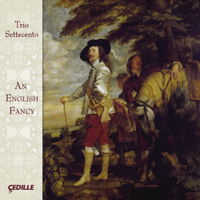
 Trio Settecento - An English Fancy
Trio Settecento - An English Fancy
CDR 90000 135
24 bit digital recording
NEW RELEASE
Playing time: 79'47"
Tracks: 29
Booklet pages: 20
© 2012 Cedille Records
Reviewer: Robert Anderson
Review of Trio Settecento - An English Fancy published on 2 December 2012
Trio Settecento:
Rachel Barton Pine, violin
John Mark Rozendaal, viola da gamba
David Schrader, harpsichord/positiv organ
William Byrd (1539-1623):
1 Sellinger's Rownde
Tobias Hume (c1569-1645):
2 Captaine Hume's Lamentation
William Lawes (1605-1645):
Suite No 8 in D
3 Fantazia
4 Almaine 'la goutte'
5 Galliard
John Jenkins (1592-1678):
Suite No 2 in G minor
6 Fantasia
7 Air
8 Corant
Christopher Simpson (c1605-1669):
'The Little Consort', Suite in G minor/major
9 Pavan
10 Corant
11 Ayre
12 Corant
13 Alman
14 Corant
15 Saraband
Thomas Baltzar (c1631-1663):
16 John Come Kiss Me Now
Matthew Locke (c1621-1677):
'For Several Friends', Suite in B flat major
17 Fantazie
18 Pavan
19 Ayre
20 Courante
21 Sarabande
22 Jigg
Henry Purcell (1659-1695):
Ayres for the Theatre
23 Overture (Bonduca)
24 Slow Air (Distressed Innocence)
25 Air (The Virtuous Wife)
26 Hornpipe on a Ground (The Married Beau)
27 Dance for the Chinese Man and Woman (The Fairy Queen)
28 Pavan in B flat major
29 Hornpipe 'Hole in the Wall' (Abdelazer)
Trio Settecento, the 'superlative Chicago-based early music ensemble' (Gramophone) completes its geographical grand tour of the European Baroque with An English Fancy, its highly anticipated survey of English Baroque chamber works. It's the final leg of a musical journey that has delighted record collectors and critics alike. Previous installments include An Italian Sojourn, A German Bouquet, and A French Soirée.
On An English Fancy, trio members Rachel Barton Pine, violin; John Mark Rozendaal, viola da gamba; and David Schrader, harpsichord and positiv organ, focus on the fantasy, the form that infatuated English Baroque composers. Listeners will venture into unusual realms of sonic imagination by virtue of the daring experiments in melody, harmony, counterpoint, and other musical elements heard in these 16th- and 17th-century works.
English folk tunes infuse many of the pieces. The CD opens with Trio Settecento's own adaptation of William Byrd's nine keyboard solo variations on 'Sellenger's Rownde'. It closes with the trio's variations on Henry Purcell's 'Hole-in-the-Wall'.

|
|
|

